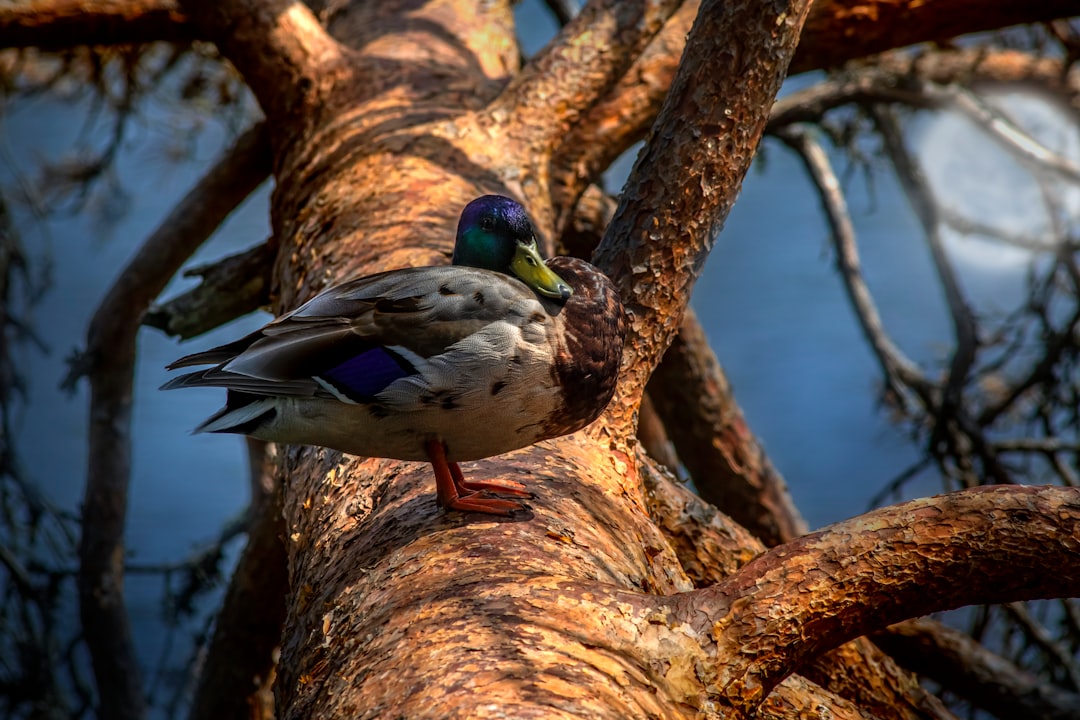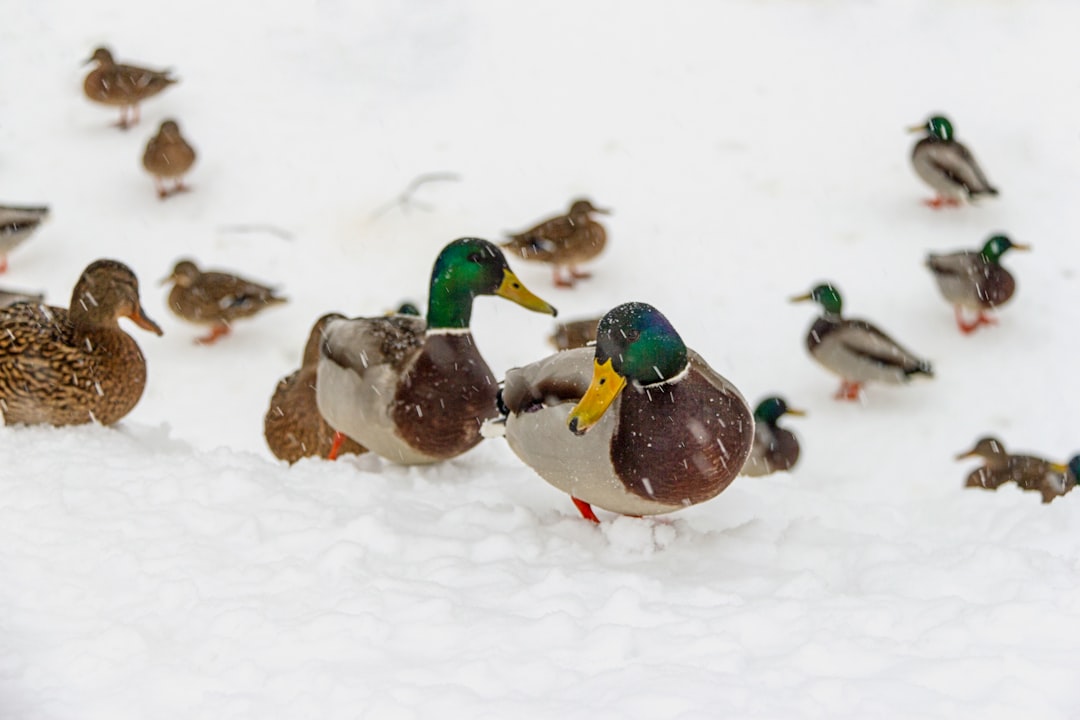Have you ever wondered where ducks sleep at night? While you may have seen them swimming in ponds or waddling on land during the day, it’s not uncommon to come across a group of ducks perched up in trees at night.
But do ducks sleep in trees? So Answer is here, Yes, ducks are known to sleep in trees. While they typically spend their days in bodies of water or on land, ducks have been observed roosting in trees at night for protection from predators.
These birds have strong legs and claws that allow them to climb trees and find a secure spot to rest. Not all duck species are capable of this behavior, and some may prefer to sleep on the ground or in water.
In this article, we’ll explore the sleeping habits of ducks and find out if they truly have a knack for tree-climbing.
The sleeping habits of ducks can vary depending on their habitat and environment.
Do Ducks Sleep In Trees?
Ducks do sleep in trees but they prefer to sleep on the ground, close to the water’s edge, where they can take refuge in case of danger. Different types of ducks have different sleeping habits to protect themselves from predators.
For example, perching ducks, including pink-eared ducks, Muscovy ducks, Mandarin ducks, teals, and comb ducks, prefer to sleep in trees to avoid ground predators.
Some ducks do sleep in trees, but not all ducks.
- Wood ducks are the most common ducks that sleep in trees. They have a special adaptation that allows them to climb trees, which is their sharp claws. Wood ducks also have a layer of feathers that help them stay warm at night, even when they are sleeping in trees.
- Muscovy ducks are another type of duck that sometimes sleeps in trees. They are not as good at climbing trees as wood ducks, but they can still do it. Muscovy ducks often sleep in trees during the winter, when the water is too cold to sleep in.
- Most other ducks do not sleep in trees. They sleep on the ground, in the water, or in communal roosts.
Here are some of the reasons why some ducks sleep in trees:
- Safety: Trees can provide a safe place for ducks to sleep, as they are high off the ground and away from predators.
- Warmth: Trees can also provide warmth for ducks, as they can tuck their feathers in and stay hidden from the wind.
- Nesting: Some ducks, like wood ducks, build their nests in trees. This means that they are already used to sleeping in trees, so they may continue to do so even after they have hatched their chicks.
Sleeping Habits Of Ducks:
Ducks are diurnal animals, which means they are active during the day and sleep at night. Unlike humans, ducks do not have a regular sleep pattern.
They sleep with one eye open and one eye closed, which is known as unihemispheric slow-wave sleep.
Smaller Ducks Like Wood Ducks Prefer To Live In Trees.

Wood ducks are a prime example of ducks that prefer to live in trees. They have sharp claws that allow them to cling to the bark of trees and find a cozy spot to sleep.
These ducks will often make their nests in tree cavities or nest boxes, providing them with an elevated, secure place to raise their young.
While not all duck species sleep in trees, it is a common behavior among many types of ducks. Their sleeping habits vary depending on their environment and the potential threats they face from predators.
Whether they’re sleeping on land or water, with one eye open or closed, ducks have developed unique ways to stay safe while getting the rest they need.
Do Ducks Sleep In Trees In The Winter?

Ducks may sleep in trees during the winter, but their sleeping habits can vary depending on the weather conditions and availability of resources.
Some ducks may migrate to warmer areas during the winter months, while others remain in their habitats and adapt to the colder temperatures.
During this time, ducks may huddle together for warmth or even use their feathers as insulation.
Do Ducks Sleep In Trees When It Rains?
Ducks may not choose to sleep in trees during heavy rain or storms. Instead, they will seek shelter in bushes, under overhanging branches, or even underwater.
Some ducks, such as mallards, have been observed sleeping with their heads tucked under their wings while floating on water during light rain.
List Of Ducks Can Sleep In Trees
List of Ducks That Can Sleep in Trees:
1. Mandarin Duck . These beautiful ducks are native to East Asia and are known for their vibrant plumage. They are also skilled climbers and can sleep in trees.
2. Wood Duck. Found in North America, the wood duck is a popular game bird. They are also skilled at perching in trees and sleeping there.
3. Muscovy Duck. Native to South America, these ducks are often kept as domesticated birds. They are also known for their ability to sleep in trees.
4. White-faced Whistling Duck. These ducks are found in Africa and South America and are known for their distinctive whistling calls. They are also able to sleep in trees.
5. Comb Duck . This unique-looking duck is found in parts of Africa and South America. They have strong legs and feet, which allow them to climb trees and sleep in them.
Do Ducks Go To Bed On Their Own?
Yes, ducks have a natural instinct to go to sleep on their own. They usually settle down for the night around sunset and will often choose a safe spot near water or on land to sleep.
During the winter months, when daylight hours are shorter, ducks may also take naps during the day to ensure they get enough rest.
Why Do Ducks Sleep With Their Heads Backward In Trees?
Ducks often sleep with their heads tucked under their wings, whether they are on land or in trees. This position helps them conserve body heat and protect themselves from predators.
Sleeping with their heads turned backward may allow ducks to keep an eye out for potential threats while still resting.
While not all ducks sleep in trees, many species have adapted to this unique behavior as a way of staying safe and secure.
From perching on branches to nesting in tree cavities, these adaptable birds never cease to amaze us with their resourcefulness and resilience.
How To Create The Perfect Sleep Environment For Ducks In Trees?
Creating the perfect sleep environment for ducks in trees involves providing safe and secure roosting spots. This can include planting trees with sturdy branches or installing birdhouses at appropriate heights.
It’s important to ensure that any structures used for roosting are stable and won’t sway in the wind, which could cause the ducks to lose their balance and fall.
Providing nesting materials such as grasses and twigs can encourage ducks to create a cozy sleeping spot.
It’s also important to keep the area free of potential predators, such as raccoons or cats, by installing predator guards around trees or birdhouses.
Why Can Muscovy Ducks Roost On Trees When Other Ducks Can’t?

Muscovy ducks have unique physical adaptations that allow them to roost on trees when other ducks cannot. They have strong claws that enable them to climb trees and perch on branches.
Their feet are covered in rough scales that provide better grip and traction on slippery surfaces, such as wet tree branches.
Is It Beneficial For Ducks To Sleep In Trees ?
Sleeping in trees can be beneficial for ducks as it provides a safe and secure roosting spot away from potential predators. It also helps conserve body heat and energy, especially during colder months.
Risks For Ducks To Sleep In Trees .
While sleeping in trees can provide many benefits for ducks, there are also some risks involved. One of the biggest dangers is falling from the tree while sleeping, which can result in serious injury or death.
Predators such as raccoons, snakes, and owls may also pose a threat to ducks roosting in trees. Trees can be affected by weather conditions such as strong winds or storms, which could cause branches to break or fall.
It’s important to regularly check the stability of any structures used for roosting and remove any potential hazards that could harm the ducks.
Despite these risks, many duck species have evolved to sleep in trees and have adapted their behaviors accordingly.
How Ducks Sleep To Stay Warm In Trees?
Ducks have developed several ways to stay warm while sleeping in trees. One of the most effective methods is to tuck their heads under their wings and fluff up their feathers, creating an insulating layer of air.
This helps to trap body heat and keep them warm throughout the night.
Conclusion!
Ducks can sleep in trees and have unique physical adaptations that allow them to do so. Providing a safe and secure roosting spot for ducks in trees is essential to their well-being.
While sleeping in trees can be beneficial for ducks by providing warmth, safety, and energy conservation, it also poses risks such as falling and potential predators.
It’s important to regularly check the stability of any structures used for roosting and remove any potential hazards that could harm the ducks.
We should respect their resting time by observing them from a distance and refraining from disturbing them. By understanding how ducks sleep in trees and supporting their unique sleeping habits,
we can help protect these fascinating birds and appreciate their amazing adaptations.
FAQs
Can Ducks Sleep in Trees?
Yes, some duck species such as Muscovy ducks have physical adaptations that allow them to roost on trees.
Why Do Ducks Sleep in Trees?
Sleeping in trees provides a safe and secure roosting spot away from potential predators and helps conserve body heat and energy.
Are All Duck Species Able to Sleep in Trees?
No, not all duck species have physical adaptations that allow them to climb or perch on branches.
What Are the Risks for Ducks Sleeping in Trees?
The risks include falling from the tree while sleeping and being preyed upon by predators such as raccoons, snakes, and owls.
How Do Ducks Stay Warm While Sleeping in Trees?
They tuck their heads under their wings and fluff up their feathers to create an insulating layer of air. They may also huddle together with other ducks for warmth and use nesting materials for additional insulation.




